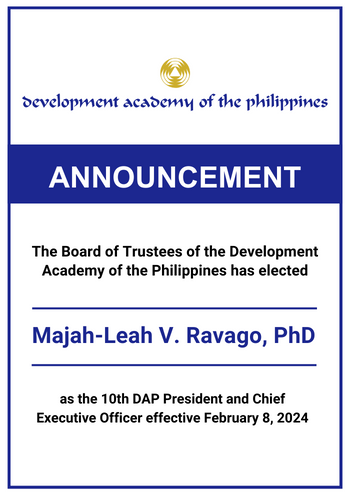
The Development Academy of the Philippines’ Center for Governance (CFG), in coordination with the Department of the Interior and Local Government-Autonomous Region in Muslim Mindanao (DILG-ARMM), has collaborated with the Japan International Cooperation Agency (JICA) in implementing the foundation course on local governance and development for the ARMM, with some 31 ARMM local government unit (LGU) managers in attendance at the training course held from July 23-27, 2018 at Al Nor Hotel and Convention Center in Cotabato City.
As part of the Leadership Enhancement and Development (LEAD) training component of the consulting services for the Knowledge Co-Creation Programme of the Revenue Enhancement Assistance in ARMM LGUs (REAL) Sub-Project, the training is aimed at strengthening the capability of ARMM LGUs in performing their mandated duties and functions in accordance with the Muslim Mindanao Autonomy Act No. 25 and the ARMM Reform Agenda.
The intervention is expected to help the LGUs understand local development issues and concerns and assist them in addressing these through good governance and phronetic leadership.
A total of 40 participants that included the 31 LGU managers joined the training. They all came from five municipalities, namely, Ampatuan, Barira, Balindong, Matanog and Taraka as well as the DILG-ARMM.
To relate local development to national development thrusts and goals, the National Economic Development Authority-Region XII’s Romel Patrick Tanghal discussed the linkages of the Philippine Development Plan, Ambisyon 2040, and the Sustainable Development Goals. He likewise shared various strategies that LGUs can adopt in order to advance the appropriate interventions at the local level.
Taking off from the discussion on national plans and applicable strategies, the participants were tasked to provide their insights on the past and current situation of the ARMM, particularly 15 years ago and thereafter.
The learning activity was deepened through the session of Fausiah Romancap Abdula, chief of the Local Government Monitoring and Evaluation Division of the DILG-ARMM. The session surfaced common issues and challenges that affect the region’s current situation.
Most of the LGUs shared common challenges on leadership, budget allocation, peace and order, and program implementation.
ARMM Executive Secretary Atty. Laisa Masuhud Alamia, meanwhile, explained good governance principles and practices at the local level and emphasized the key role of public managers as think tank of local chief executives. According to her, effective people lead their lives according to principles. This directed her discussion towards the concept of leadership with Islamic values, which she said is exemplified by a leader or manager who is servant, consultative, trustworthy, and just all rolled into one. She likewise presented the major gains and achievements of the ARMM from 2012-2018.
For the participants to acquire a basic understanding of knowledge-based leadership, the DAP’s Rocio Isabel Paloma conducted a session on knowledge creation and phronetic leadership, which serve as foundation for innovation and transformation within and outside the realm of LGUs.
The experience of the Municipal Government of Siayan, meanwhile, was shared by Maybel Bustaliño, the provincial agriculturist of Zamboanga del Norte, as an effective example of transformative leadership.
To level off the participants’ understanding of the concept of knowledge creation, they were tasked to apply the Socialization, Externalization, Combination, Internalization (SECI) model by identifying applicable elements and activities from Siayan’s experience.
A series of workshops was also attended by the participants. These workshops included revisiting local issues and challenges on revenue generation, and action planning on knowledge creation process and management, which would lead to the development of a project concept design and implementation plan.
Nomaire Madid, Director for Administrative Services of the DILG-ARMM, thanked the JICA and the DAP for conducting the LEAD Training for Managers and congratulated the LGUs for actively participating during the five-day course. He emphasized that as managers, they are catalysts for peace and development.
Meanwhile, Hiroshi Takeuchi, chief advisor of the JICA-Cotabato Project Office, also acknowledged the efforts of the participating LGUs in taking part in the implementation of the REAL project. He said there are ongoing different levels of capacity development activities led by the JICA and the DILG-ARMM. The concept of knowledge co-creation, he said, would therefore be effective in improving the leadership and governance strategies of ARMM regional offices, municipalities as well as communities.
The participating LGUs will continue to attend three more courses that will be implemented by the DAP in partnership with the JICA and the DILG-ARMM.




